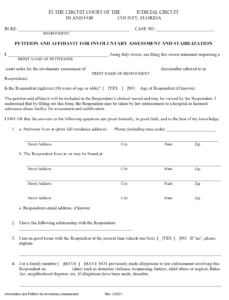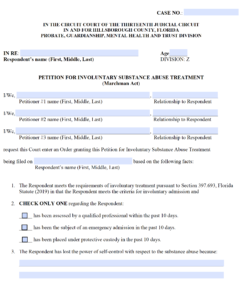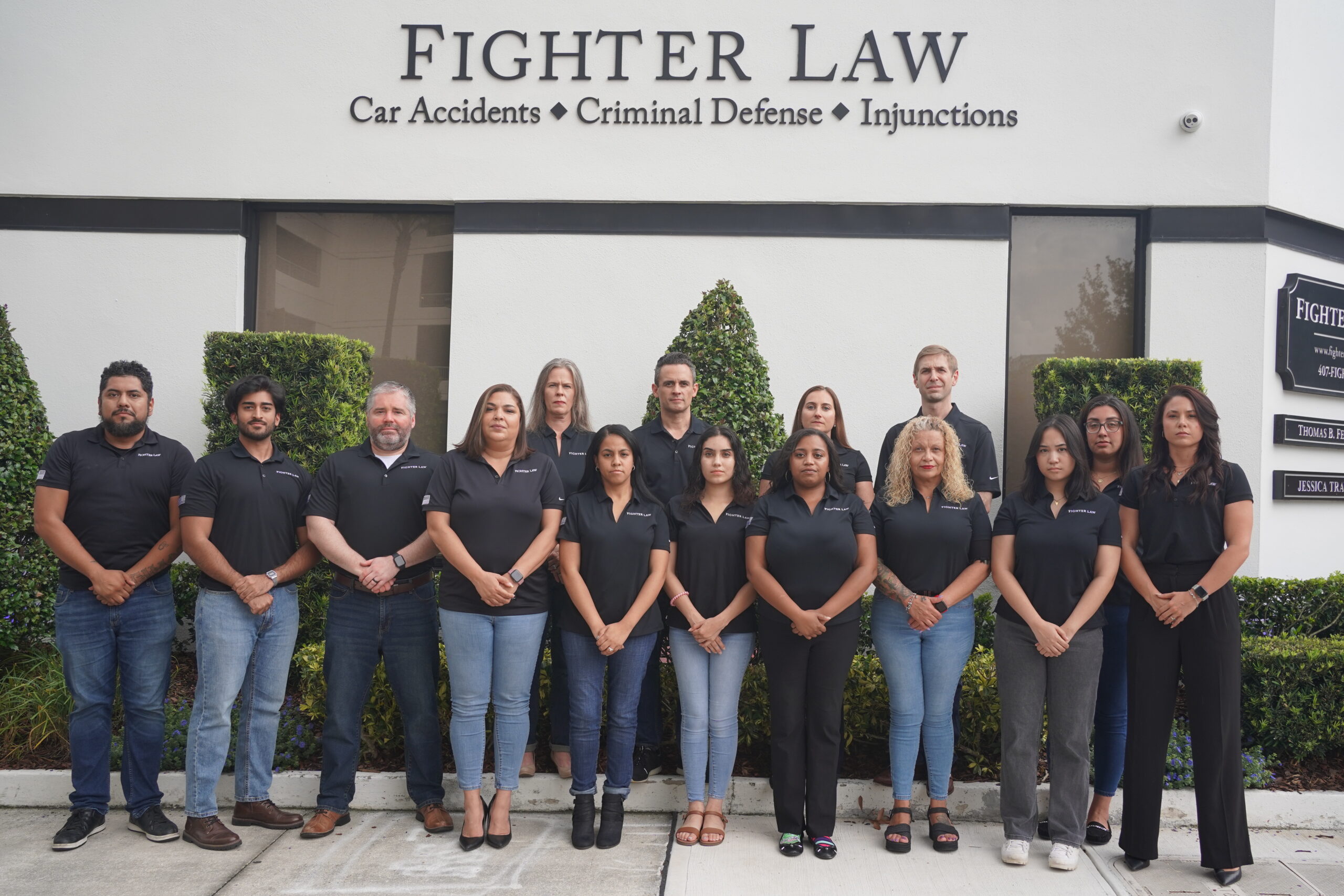Orange County Marchman Act Lawyer

What is the Marchman Act?
The Marchman Act allows for the involuntary civil commitment of a person who is struggling with substance abuse addiction. They have to have become powerless to that addiction, and can no longer rationalize that they need help with their addiction. The person must not be willing to seek voluntary treatment on their own and they must be at risk of harming themselves or others without the intervening treatment. It is also known as Florida’s Substance Abuse Impairment Act.
Why should I file a Marchman Act petition for my loved one?
Out of love. Usually when you get to this point, the person is not thinking rationally and it is up to you to save their life. You have probably tried to get them to get help and treatment voluntarily. When that fails, you have to go with involuntary treatment. And that’s exactly why the Marchman Act was passed.
How is a Marchman Act filed?
The process is done in two parts. Part One is getting them stabilized and assessed involuntarily. Part Two is getting them treatment involuntarily. Both parts of this process require you to fill out a petition and a judge to issue an order. So the first thing to do is to get your loved one into a treatment facility with the assistance of the police. Once they are stabilized there, the next thing is to get them treated.
Does it cost me anything to have my loved one Marchman Acted?
No. There is no filing fee and there is no cost to you for their treatment.
Who can file a Marchman Act?
Anyone can file as long as they have personal knowledge of the substance abuse impairment of the respondent and their risk to themselves or others. This is usually done by a family member or a loved one.
What is the process of filing a Marchman Act?
Part One: To initiate the process, you must file the four-page Petition for Involuntary Substance Abuse Assessment and Stabilization. See the example form here and below. This form has be notarized and that can be done with your local clerk’s office. The petition will then be reviewed by a Judge. If the Judge finds it to be legally sufficient, then they will grant the petition and you will have to take that order to your local Sheriff’s Office to be processed and served. In Orlando, this can all be done in the Courthouse Downtown.
Sheriff’s Civil Service: Different Counties handle this part of the process differently. In Orange County, for example, they handle this part of the process by having you come pick up the approved petition from the clerk’s office and deliver it to the Sheriff’s Civil Service Office (which is also located in the part of the Courthouse). They will then give you a packet with instructions on how to call a deputy to execute the warrant. This warrant is only good for seven days. So if you don’t have it served in that time, you have to start the process over.
Executing the Warrant: This part is usually the most difficult because it is where you will have to watch your loved one be taken into police custody. It is dangerous for police officers for obvious reasons, so be sure to tell them if the person has any weapons on them or available to them. Once in police custody, they will not go to jail. They will be taken to a treatment facility for receiving/assessment.
Substance Abuse Receiving Facility: Once the warrant has been executed, the respondent will be taken to a substance abuse receiving facility in your area. You will be provided with that facility’s information. You should hear from this facility within five days of the your loved one’s admission. The facility will complete the substance abuse assessment and stabilize them. They should now be safe. Your loved one must participate in the assessment and stabilization process because it is a court order. Any failure to do so, could result their being held in contempt of court. In that case, they will go to jail for not cooperating.
Part Two: Once Part One is completed, you must file Part Two in order to continue this process. If you do not complete Part Two, your loved one will probably just be released without much needed treatment. So be sure to stay on it and fill out this next part. The Part Two process is very similar to Part One. You have to go back to the clerk’s office and file a Petition for Involuntary Substance Abuse Treatment. You must wait to hear from the facility to file this part, as you will need some information from them in order to complete the petition.
Court Hearing: Once the Judge reviews the Part Two petition and the assessment from the substance abuse facility, he or she will set it for a hearing. At this hearing, the petitioner and respondent will be present, and the level of treatment will be determined and ordered. This is a closed hearing, however, you can have a lawyer there to advocate for you on behalf of your loved one.
Treatment: If treatment is ordered, it is a court order that the respondent (your loved one) go to and participate in the treatment. Any failure to do so could result in contempt of court. Basically, that leaves them with two options: treat or go to jail – and then treat. Your loved one can, however, hire their own attorney to advocate against treatment. While that is possible, it is very rare.
How long does a Marchman Act last?
Part One of the Marchman Act process has no definite timeframes. You do, however, have seven days from date that the warrant is issued to find, arrest, and deliver your loved one to the substance abuse central receiving facility. Once at the facility, the staff has five days to complete the substance abuse assessment under the statute, however, they can ask for an extension for up to seven extra days. Upon completion of Part One, the facility has three options under the statute, These options are up to the facility’s discretion and are on a case-by-case basis. Those options are (1) release your loved one, (2) keep them, but on a voluntary basis, or (3) retain them until the Part Two court date. If they are retained, they will be securely transported to court for the hearing.
(Fla. St. 397.6811-397.6822)
If you have been court ordered into Treatment under Part Two of the Marchman Act, each treatment order is good for 90 days. At the end of each 90 day period, a renewal petition can be entered by your substance abuse treatment center or the petitioner. If that happens, a hearing will only be held if your loved one contests the extension of treatment.
(Fla. St. 397.697)
What happens if I do not file Part Two?
If no Part Two is filed in the given time frame, the case will be dismissed, and you must restart the process at Part One should you ever wish to go forward again.
Do I need a lawyer to file a Marchman Act?
No. As the Petitioner in a Marchman Act, you do not need a lawyer to file. However, the petitions do ask some serious and emotional questions, your statements are notarized and have to be sworn under oath, so having the help of an attorney who understands the statute surrounding the Marchman Act can be beneficial. An attorney can also make sure you have a legally sufficient petition – so it is not denied. Furthermore, the attorney can then go with you to file the petition with the clerks and handle a lot of the routine courthouse errands that are involved in the initial process. During the Part Two process, there will be a hearing at the courthouse before a judge. Having an attorney to represent you means you do not have to go through this process alone. They will be able to speak with the judge and prepare you for questions that may be asked of you during the hearing process.
As the Respondent in a Marchman Act your loved one will be assigned an attorney at the Part Two hearing. Typically this is someone from the Regional Conflict Counsel Office. They will not be provided one before that. If, when they are served and arrested under Part One, they believe that their rights have been violated and the petition was filed under fraudulent pretenses, you may need assistance from an attorney prior to the Part Two process.
Will a Marchman Act show up on a background check?
No. Marchman Act petitions and procedures are confidential and not subject to disclosure without proper process – like a court order. So the chances of them showing up on any back check are very low.
Do we handle these types of cases?
Yes, we handle these cases from both sides helping petitioners and respondents. We are very passionate about substance abuse issues and understand how they can affect the lives of many. If you need our help on a Marchman Act case, help in starting the process, or need more information call us at 407-344-4837. We fight because we care.
free case evaluation
Fill out the form below for an free evaluation of your case.




Practice Areas
- Criminal Defense
- Disney Ban and Disney Trespass Lawyers
- Family Law
- Fighter Law Representing Domestic Violence Victim, Kristin Evans, Attacked by Ex-NFL player Zac Stacy
- Orange County Marchman Act Lawyer
- Orlando Family Law Attorneys
- Personal Injury Lawyers
- Restraining Orders and Injunctions
- Victim Representation in Florida - Aggressive Lawyers for Victims

Practice Areas
Learn more about our services in Criminal Defense, Personal Injury, and Injunctions.

We Fight for Outstanding Case Results
We are driven to get you results. Review the outcomes on recent cases we've handled.





